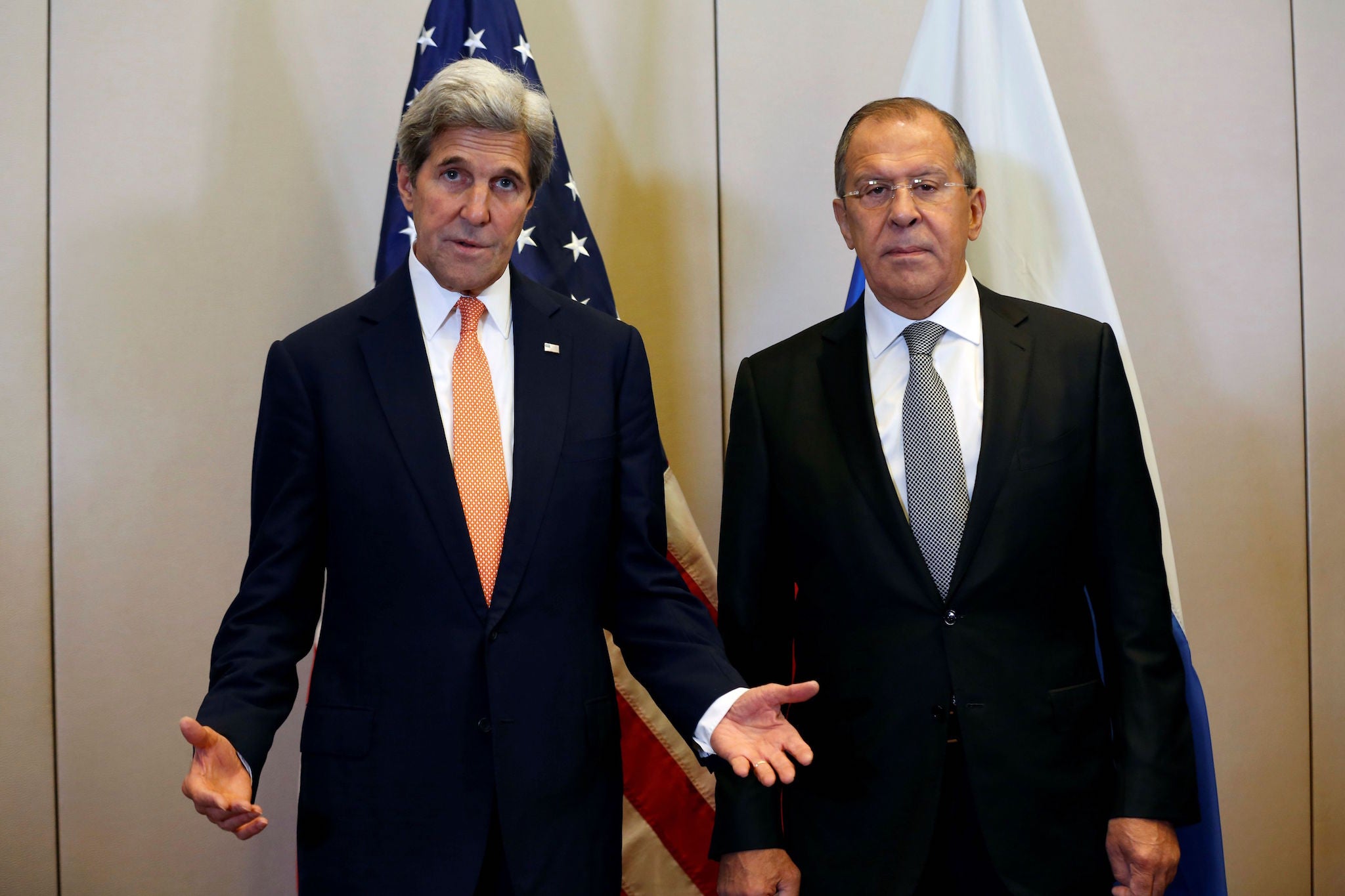Syria peace deal: US and Russia agree plan to reduce violence and lead to 'political transition'
A nationwide ceasefire between government forces and rebels is set to begin at sunset on Monday
Your support helps us to tell the story
From reproductive rights to climate change to Big Tech, The Independent is on the ground when the story is developing. Whether it's investigating the financials of Elon Musk's pro-Trump PAC or producing our latest documentary, 'The A Word', which shines a light on the American women fighting for reproductive rights, we know how important it is to parse out the facts from the messaging.
At such a critical moment in US history, we need reporters on the ground. Your donation allows us to keep sending journalists to speak to both sides of the story.
The Independent is trusted by Americans across the entire political spectrum. And unlike many other quality news outlets, we choose not to lock Americans out of our reporting and analysis with paywalls. We believe quality journalism should be available to everyone, paid for by those who can afford it.
Your support makes all the difference.The US and Russia have agreed a peace deal for Syria, with a nationwide ceasefire between government forces and rebel groups set to begin early next week. Speaking in Geneva in the early hours of Saturday, US Secretary of State John Kerry said the agreement would be a “turning point” for the war-torn country if implemented, and suggested it could also lead at last to the removal of President Bashar al-Assad.
Mr Kerry said the plan was intended "to reduce violence, ease suffering and resume movement towards a negotiated peace and a political transition in Syria."

The arrangement is set to go into effect with a cessation of hostilities from sunset next Monday, 12 September, between the Syrian government forces of President Bashar al-Assad, who is supported by Russia, and US-backed opposition rebels. The deal requires both the rebels and the regime in Damascus “to meet their obligations,” Mr Kerry said.
Despite simmering tensions between Washington and Moscow, the US and Russian militaries will then work together to target Islamic State forces and the al-Nusra Front, the al-Qaeda affiliate that is operating in Syria. Mr Kerry insisted the terror groups would have to be pursued “not indiscriminately, but in a systematic way.”
The agreement calls for Assad to ground his air force over opposition areas and halt combat missions against specified rebel forces. Following a period of calm and attempts to gather intelligence on the two terror groups, the US and Russia then plan to launch joint air strikes against Isis and the al-Nusra Front.
Friday’s negotiations at a hotel in Geneva had stretched long into the night. Mr Kerry announced the agreement shortly after Saturday at a joint press conference with Russia’s foreign minister Sergey Lavrov, who confirmed the deal and emphasised that Assad’s government was prepared to comply with its terms.
“This is not the end of the journey, this is the very start of our new relations,” Mr Lavrov said. “We hope that all those who sincerely value peace, who cherish a Syrian, multinational, multi-confessional state, will support our agreement."
The marathon meeting was the fourth such encounter between US and Russian diplomats in the past fortnight, as the world strained to see whether there might at last be a formula for ending the five-year civil war in Syria, which has already claimed 500,000 lives and triggered the largest refugee crisis since the Second World War.
Fighting between rebels and Assad’s forces has recently reached new levels of ferociousness in and around the divided northern city of Aleppo, where human rights groups report the conflict has claimed more than 700 civilian lives in the last 40 days, including 165 children. The deal calls for unimpeded humanitarian access to all of Syria’s worst afflicted areas, including Aleppo.
"The suffering that we have witnessed in Syria over the course of five years now is really beyond inhumane," Mr Kerry said. "If this arrangement holds, then we will see a significant reduction in violence across Syria. We’ll see humanitarian aid deliveries go forward in Aleppo, wherever the need is the greatest. And after a period of reduced violence, then we will see the US and Russia taking coordinated steps to isolate and defeat the terrorist groups that have added immeasurably to Syria’s suffering and misery. And we will facilitate a political transition, which is the only way to bring about a durable end to this war."

Join our commenting forum
Join thought-provoking conversations, follow other Independent readers and see their replies
Comments